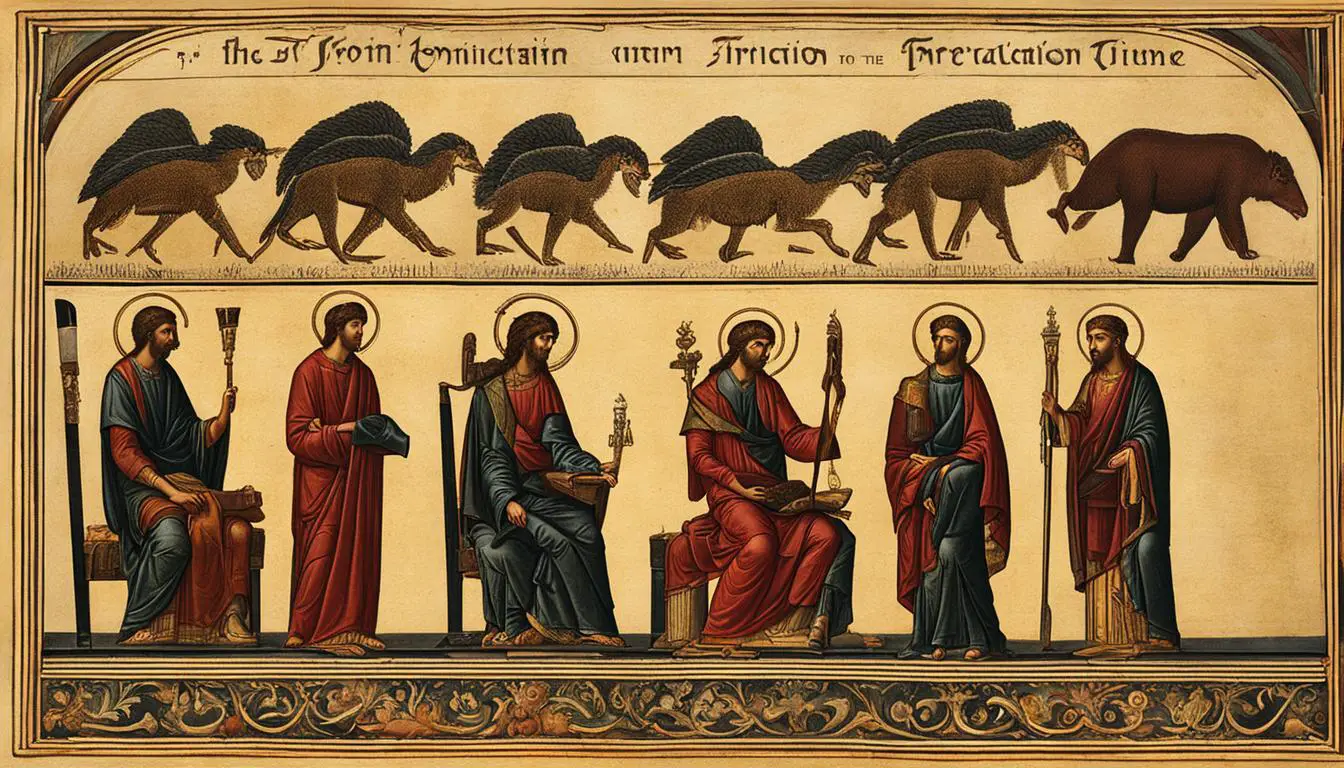The Bible provides a clear definition of Gentiles as individuals who are not Jews, belonging to the nations outside of Israel. This term is significant in understanding the biblical context and the inclusion of non-Israelite nations in God’s plan of salvation.
The Hebrew word for Gentile is “goyim,” which means “nations.” In the Greek language, Gentiles are referred to as “ethnē,” also meaning “nations.” These terms emphasize the distinction between the Israelite people and the nations surrounding them.
Throughout the Bible, several passages shed light on the status of Gentiles. The Old Testament portrays Israel as a light to the Gentile nations, with the prophets envisioning a future where all nations would worship the Lord and be blessed through Israel’s example.
In the New Testament, the apostle Paul plays a crucial role in advocating for the inclusion of Gentiles in the early church. He affirms that there are “no racial, social, or spiritual distinctions” in the body of believers, welcoming Gentiles as full heirs of God’s promises through faith in Jesus.
Today, the understanding of Gentiles extends beyond biblical times. Gentiles represent the majority of believers worldwide and play a vital role in the growth and spread of the Christian faith.
While there may be different interpretations and opinions among scholars and theologians, the biblical narrative remains a testament to God’s love for all people and the potential for redemption for both Jews and Gentiles.
Key Takeaways:
- The Bible defines Gentiles as individuals who are not Jews, belonging to the nations outside of Israel
- The Hebrew word for Gentile is “goyim,” and the Greek word is “ethnē,” both meaning “nations”
- The Old Testament envisions a future where all nations would worship the Lord and be blessed through Israel’s example
- The apostle Paul advocated for the inclusion of Gentiles in the early church, emphasizing equality in God’s kingdom
- Gentiles represent the majority of believers worldwide and play a vital role in the growth of the Christian faith
The Etymology of the Term “Gentile”
Understanding the origins and etymology of the term “Gentile” is key to grasping its biblical meaning. The word “Gentile” stems from two significant sources: the Hebrew word “goyim” and the Greek word “ethnē.” Both words denote “nations” in their respective languages. In the Hebrew Bible, “nations” referred to the non-Israelite peoples, while in Greek, it described those outside a specific community. Over time, the term evolved to encompass all non-Israelite nations, regardless of their racial or ethnic background.

The biblical understanding of Gentiles emphasizes their categorization based on family, bloodline, and nationhood rather than their faith or beliefs. It highlights a broader sense of inclusivity, recognizing the existence and significance of various nations and cultures. This perspective invites us to appreciate the diversity and richness of humanity as depicted in the Bible.
“The biblical understanding of Gentiles encompasses all non-Israelite nations, regardless of their racial or ethnic background.”
The Hebrew and Greek Roots: A Closer Look
The Hebrew word “goyim” occurs frequently in the Old Testament and serves to distinguish the non-Israelite nations from the chosen people of Israel. It is crucial to note that the term was not an inherently derogatory label but rather a descriptive one. In its original context, “goyim” referred to the Gentile nations with whom the Israelites interacted and had distinct relationships.
Similarly, the Greek word “ethnē” is used in the New Testament to communicate the concept of Gentiles. It encompasses both non-Jewish individuals and nations, expanding beyond ethnic boundaries. The term emphasizes the inclusive nature of the Gospel message, highlighting that salvation is available to all people, regardless of their cultural background or ethnicity.
Key Bible Verses
The Bible contains several passages that shed light on the understanding of Gentiles. Romans 3:29 states, “Is God the God of Jews only? Is he not the God of Gentiles too? Yes, of Gentiles too,” emphasizing the equal divine love and care for both Jews and Gentiles. Additionally, Acts 10:34-35 expresses that God does not show favoritism but welcomes those from every nation who fear Him and do what is right.
Summing It Up
The etymology of the term “Gentile” reveals its biblical understanding as encompassing all non-Israelite nations, emphasizing inclusivity and recognizing the diversity of humanity. The Hebrew word “goyim” and the Greek word “ethnē” form the foundation for this understanding, guiding our interpretation of Gentiles in the Bible. Key verses in both the Old and New Testaments reaffirm God’s love and acceptance of Gentiles, highlighting their equal standing in His kingdom.
Gentiles in the Old Testament
The Old Testament provides valuable insights into the interactions between Israel and the Gentiles, shedding light on the biblical perspective on Gentiles. While there are instances of animosity and conflict, the ideal relationship depicted is one of righteousness and example-setting.
Israel, God’s chosen nation, was called to be a “holy nation” and a light to the Gentiles, influencing them through their obedience to God’s commandments. The prophets foresaw a future where all nations would come to worship the Lord and be blessed through Israel’s example.
It is important to note that the Bible does not portray Gentiles as eternal enemies or reject them solely based on their ancestry. Instead, the wicked nations were those who engaged in idolatrous practices and opposed God’s righteous ways. The Gentiles in the Old Testament had the potential for redemption and inclusion in God’s plan, highlighting the inclusivity and love of God for all people.
Gentiles in the New Testament
In the New Testament, the term “Gentiles” continues to refer to non-Israelite nations. While Jesus initially instructed his disciples to focus on the lost sheep of the house of Israel, His ministry gradually expanded to include the Gentiles as well. This shift in perspective is evident in various biblical passages that highlight the inclusion of Gentiles in the spreading of the gospel message.
One of the pivotal moments in the early church’s understanding of Gentile inclusion is recorded in the book of Acts. The conversion of Cornelius, a Gentile centurion, demonstrates the breaking down of barriers and the acceptance of Gentiles into the faith community. Peter, after receiving a vision from God, proclaims, “Truly I understand that God shows no partiality, but in every nation anyone who fears Him and does what is right is acceptable to Him” (Acts 10:34-35).
The apostle Paul played a significant role in advocating for the equality of Gentiles in the church. He emphasized that salvation is not limited to the Jewish people but is available to all through faith in Jesus Christ. In his letter to the Galatians, Paul writes, “There is neither Jew nor Greek, slave nor free, male nor female, for you are all one in Christ Jesus” (Galatians 3:28).

Through the New Testament, the message is clear — Gentiles can be saved and become part of the body of believers. The gospel is not restricted to a particular ethnic group but is open to all who believe. The inclusion of Gentiles in the early Christian community was a groundbreaking revelation that continues to impact the way we understand and practice our faith today.
The Role of Gentiles in Biblical Stories
Throughout the Bible, there are numerous stories that involve Gentiles and their interactions with Israelites. These stories highlight the acceptance and redemption of Gentiles by God and demonstrate that salvation is not limited to a particular ethnicity or nationality. Let’s take a closer look at some of these significant Bible stories about Gentiles.
Rahab
“Then Joshua secretly sent out two spies from the Israelite camp at Acacia Grove. He instructed them, ‘Scout out the land on the other side of the Jordan River, especially around Jericho.’ So the two men set out and came to the house of a prostitute named Rahab and stayed there. But someone told the king of Jericho, ‘Some Israelites have come here tonight to spy out the land.’”
Rahab, a Canaanite prostitute, played a crucial role in the Israelites’ conquest of Jericho. She hid the Israelite spies and helped them escape, ultimately aiding the Israelites in their victory over the city. Rahab’s faith in the God of Israel led her to protect the Israelite spies and seek salvation for herself and her family. Her story shows that God’s grace extends to all, regardless of their background or past.
Ruth
“But Ruth replied, ‘Don’t ask me to leave you and turn back. Wherever you go, I will go; wherever you live, I will live. Your people will be my people, and your God will be my God. Wherever you die, I will die, and there I will be buried. May the Lord punish me severely if I allow anything but death to separate us!’”
The story of Ruth, a Moabite woman, showcases her unwavering loyalty and commitment to her mother-in-law, Naomi, and Naomi’s God. Despite being a foreigner, Ruth’s faithfulness and compassion led her to become an ancestor of King David and ultimately Jesus Christ. Her inclusion in the genealogy of Jesus demonstrates God’s acceptance and grace towards Gentiles, highlighting the important role they play in God’s plan.
The Roman Centurion
“When Jesus returned to Capernaum, a Roman officer came and pleaded with him, ‘Lord, my young servant lies in bed, paralyzed and in terrible pain.’ Jesus said, ‘I will come and heal him.’”
In this story, a Roman centurion approached Jesus with great faith, believing that Jesus could heal his servant. Jesus commended the centurion for his faith, saying, “‘I tell you the truth, I haven’t seen faith like this in all Israel!’” This encounter not only demonstrated the centurion’s belief in Jesus but also showcased Jesus’ acceptance and compassion towards Gentiles. It emphasized that faith knows no boundaries and that anyone, regardless of their background, can receive God’s healing and favor.
| Gentile Stories in the Old Testament | Scripture |
|---|---|
| Rahab the Canaanite prostitute aids the Israelite spies | Joshua 2 |
| Ruth the Moabite becomes an ancestor of King David | Ruth 1-4 |
| The Roman centurion’s great faith | Matthew 8:5-13 |
These stories showcase the significant role Gentiles played in the biblical narrative and highlight the inclusivity and acceptance of God’s love for all people. They serve as a reminder that God’s grace extends beyond cultural and national boundaries, welcoming all who seek Him.
Understanding Right and Wrong in Gentile Perspectives
The Bible presents a nuanced understanding of right and wrong in the context of Gentiles. It does not portray Gentiles as inherently evil or morally corrupt. Instead, it recognizes that people from all nations have the capacity to both do good and commit wrong. Just like the Israelites, Gentiles were expected to adhere to God’s moral standards and live righteous lives.
In the biblical narratives, we see both positive and negative examples of Gentiles’ responses to God’s moral laws. For instance, Rahab, a Canaanite prostitute, displayed faith and helped Israelite spies (Joshua 2). On the other hand, there were Gentile nations that practiced idolatry and opposed God’s commands. These examples highlight the individual choices and actions of Gentiles rather than their ethnicity or nationality.
“There is neither Jew nor Gentile, neither slave nor free, nor is there male and female, for you are all one in Christ Jesus.”
Gentiles in Biblical Narratives
The biblical narratives present a diverse range of Gentile perspectives on right and wrong. While some Gentiles demonstrated faith, righteousness, and a willingness to follow God’s commands, others succumbed to sinful practices and rejected God’s guidance. Their responses varied greatly depending on their individual beliefs, cultural context, and personal choices.
It is important to approach the biblical narratives with sensitivity and understanding, recognizing that the actions of Gentiles were not representative of their entire ethnicity or nationality. The Bible teaches us that individuals bear responsibility for their own moral choices, regardless of their background or heritage.
| Gentile | Response to God’s Moral Laws |
|---|---|
| Rahab (Canaanite) | Demonstrated faith and helped Israelite spies |
| Various Gentile nations | Engaged in idolatry and opposed God’s commands |
| Cornelius (Roman centurion) | Displayed great faith and was commended by Jesus |
These examples highlight that Gentiles, like Israelites, had the capacity to either align themselves with God’s moral standards or turn away from them. It is a reminder that righteousness and moral responsibility transcend cultural boundaries and can be found in individuals from all nations.
Gentiles in Today’s World
The relevance of Gentiles in modern society is rooted in the biblical understanding that God’s love and salvation extend to all people, regardless of their ethnic or national background. In contemporary context, Gentiles represent the majority of believers worldwide and play a vital role in the spread of the gospel and the growth of the Church. The biblical narrative emphasizes inclusivity and acceptance, highlighting the significance of Gentiles as equal heirs of God’s promises through faith in Jesus.
Gentiles in today’s world continue to contribute to the diverse tapestry of the global Christian community. Their perspectives, experiences, and cultural backgrounds enrich the Church, fostering unity in the midst of diversity. The recognition of the biblical understanding of Gentiles encourages believers to embrace the diversity of God’s creation and to extend love, respect, and acceptance to all individuals, irrespective of their heritage or ancestry.
Furthermore, Gentiles in today’s society have the opportunity to learn from the biblical stories of Gentiles in the Old and New Testaments. These stories exemplify the acceptance and redemption of Gentiles by God and demonstrate that salvation is not limited to a particular ethnicity or nationality. They serve as reminders that God’s love extends to all people, and that every individual, regardless of their background, has the potential for a personal relationship with Him.
| Table: Gentiles in Today’s World | |||
|---|---|---|---|
| Relevance | Contributions to the Church | Diversity and Unity | Learning from Biblical Stories |
| Gentiles play a vital role in modern Christianity and contribute to the growth of the Church. | The perspectives, experiences, and cultural backgrounds of Gentiles enrich the global Christian community. | Gentiles exemplify the unity within diversity, fostering acceptance and respect. | Biblical stories of Gentiles serve as reminders of God’s inclusivity and love for all people. |
Different Interpretations of Gentiles
Throughout history, scholars and theologians have offered various interpretations of the concept of Gentiles in the Bible. The diversity of views reflects the complexity of the biblical text and the ongoing exploration of its meaning. While there are different perspectives, they all contribute to a deeper understanding of the role of Gentiles in God’s plan of salvation.
Some interpretations view Gentiles as exclusively non-Israelite nations, highlighting the distinction between the chosen people of Israel and the rest of the world. Others take a more inclusive approach, considering Gentiles to encompass all non-Jewish individuals, emphasizing the universal nature of God’s love and redemption.
These different interpretations invite dialogue and discussion, encouraging believers to engage with the biblical text and wrestle with its profound truths. Regardless of the specific view one holds, the overall message of the Bible remains clear – that God’s plan of salvation extends to all people, regardless of their background or heritage.
Scholarly Perspectives on Gentiles
“The diversity of interpretations regarding Gentiles in the Bible is a testament to the richness and complexity of the biblical text. It highlights the ongoing exploration and wrestling with the meaning of God’s plan for all people.” – Dr. Sarah Johnson, Theology Professor
Dr. Johnson’s statement underscores the importance of approaching the topic of Gentiles with humility and a willingness to engage with different perspectives. By doing so, believers can deepen their understanding of God’s inclusive love for all humanity.
| Interpretation | Key Points |
|---|---|
| Exclusive Perspective | Emphasizes the distinction between Israel and non-Israelite nations |
| Inclusive Perspective | Highlights the universal nature of God’s love and redemption |
Conclusion
The Bible defines Gentiles as people who are not Jews, belonging to the nations outside of Israel. This definition encompasses all individuals who are not of Jewish descent. The term “Gentile” is derived from the Hebrew word “goyim” and the Greek word “ethnē,” both meaning “nations.” Throughout the Old and New Testaments, the inclusion of Gentiles in God’s plan of salvation is emphasized, highlighting God’s love for all people.
The biblical narratives portray both positive and negative examples of Gentiles’ interactions with Israelites. These stories demonstrate that salvation is not limited to a specific ethnicity or nationality. Gentiles, like Israelites, are expected to adhere to God’s moral standards and live righteous lives. The Bible recognizes that people from all nations have the potential to both do good and commit wrong.
In today’s world, the biblical understanding of Gentiles encourages inclusivity and acceptance. It recognizes the relevance of Gentiles in contemporary society and affirms that all individuals, regardless of their background, have the potential for redemption. While there may be different interpretations and opinions among scholars and theologians, the universal nature of God’s love remains a central theme throughout the biblical narrative.
FAQ
What does the Bible define as a Gentile?
The Bible defines a Gentile as someone who is not a Jew, belonging to the nations outside of Israel.
What is the biblical understanding of Gentiles?
Gentiles are non-Israelite nations, encompassing all individuals who are not Jews.
Are Gentiles defined by their faith or beliefs?
No, Gentiles are defined by their family, bloodline, and nationhood.
How are Gentiles portrayed in the Old Testament?
The Old Testament shows that Gentiles had the potential for redemption and inclusion in God’s plan.
How are Gentiles included in the New Testament?
The New Testament emphasizes that Gentiles can be saved through faith in Jesus Christ and become part of the body of believers.
Are there any notable biblical stories involving Gentiles?
Yes, stories such as Rahab, Ruth, and the Roman centurion highlight the acceptance and redemption of Gentiles by God.
How does the Bible address Gentiles’ understanding of right and wrong?
The biblical narratives show both positive and negative examples of Gentiles’ responses to God’s moral laws.
What is the relevance of Gentiles in today’s world?
The biblical understanding of Gentiles encourages inclusivity, acceptance, and the recognition of God’s love for all people.
Are there different opinions on Gentiles among scholars?
Yes, scholars and theologians have different interpretations and opinions regarding Gentiles in the Bible.








Leave a Reply